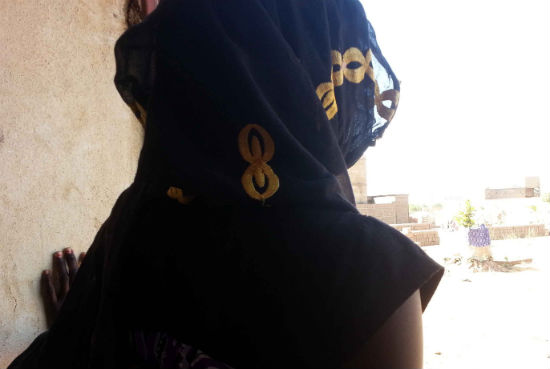
Today is unlike any other day. I am in Mali talking to families who fled the violence in the latest armed conflict to rock the West African region. In recent weeks, I have watched Mali grab headlines as government and French troops launch a military campaign against armed opposition groups. Reportedly enforcing a strict interpretation of Sharia law, these groups had been occupying Mali's northern provinces since last year. As I read the news, I shake my head -- not another war. At a certain point, I go numb from reading stories about the military intervention. But I carry on with my day.
Today is different. I am in San province working for the charity organization World Vision which is responding to the needs of displaced people who came in exodus from the north. I am face to face with Malian refugees who shake my hand and look me in the eye as they share their stories. Suddenly the statistics on TV have a human face.
In December, Namina escaped from Timbuktu, the historic homeland of the Tuaoregs and one of the areas which fell under rebel groups' control and tight grip. Namina left with her three daughters and six other children from her village. Her neighbor and their 16-year old girl Sata were left behind.
"I saw a group of [rebels] came to the house and took Sata by force," Namina reveals. "They gave her parents CFA 10,000 ($20) to marry Sata. The [rebels] said the parents had no choice and that they were taking Sata to where they lived. The girl was weeping and tried to tear herself away from her captors. Her mother was weeping," Namina recounts. "But the [rebels], they came with guns."
One day at the rebel camp, Sata got hold of a mobile phone while the rebels were away. She called her family and told them that she was placed in a house preparing food for her captors. The rebels had told her that she was the wife of one man. But Sata claimed other men raped her.
"She tried to escape once but it was impossible," Namina continues. "If she did and the rebels found her, they would take her and all her family members to a [rebel] prison." For Sata and her family's safety, seeing her at the camp was simply out of the question.
Soon the family loses touch of Sata as rebels reportedly cut off telecommunication lines. This week, government forces reached Timbuktu. Namina replies, "Now that the [rebels] are fleeing, she too can now flee -- if they haven't killed her yet." The girl's family remains in Timbuktu but Namina has no other news about them.
By mid-day, I am talking to Fatou, 16, who also left Timbuktu with her mother. Her voice is soft at first and she twists her fingers as she speaks. There is fear in her eyes but a quiet strength surfaces saying, "I am going to tell my story."

"One day, my mother sent me to the market," Fatou shares. "I knew that girls were supposed to wear a scarf to cover our heads. But that day I was not wearing one and the rebellion police saw me. They said they were going to give me a lesson.
"They beat me up," she says. "And then they sent me home." She told the incident to her mother after which they decided to leave immediately with nothing else but the clothes they wore that day.
Fatou recounts that before they left, some girls caught without scarves are beaten with a stick and given 100 lashes as punishment. At this, Fatou looks as if she is about to tear up but she remains composed. She says nothing more.
And then there were the boys
Like Sata, young boys are forcibly taken and "enrolled" in rebel training camps. They are bought for a much heftier price than girls -- CFA 200,000-400,000 ($400-800). Namina tells of a young boy she knows named Mohammed who fell prey and was recruited as a child soldier.
"These boys are very traumatized because they are taught how to use guns and how to fight," Namina explains. "The children also see people whose hands or feet are being cut off by [rebels]. This has a very negative impact on them," she says. As with young girls taken as 'brides,' escaping from the camp can only mean death.
By afternoon I am still hearing the same story line, this time from Traman Coullibaly who left the town of Douentza with his wife and baby to escape the violence. "I don't know his name but I would see this boy in the village," he says. "And then the next time I saw him he was carrying a gun."
Some adolescent boys willingly enroll themselves in camps either for economic reasons (the boys and their families are paid by rebels) or because they say they truly believe in the indoctrination by extremists.
As with Sata, families do not know of their sons' whereabouts or well-being as government forces push northwards, taking control over key cities and former rebel stronghold provinces.
As the sun is now setting on this very extraordinary day, I wonder where the Satas and the Mohammeds of this world are. I cry but my eyes are dry. I say a prayer for these lost girls and boys who should be in schools and not in rebel camps, holding books, not guns. Playing under the sun and not roaming the deadly terrains of a war zone. Children should be nowhere else but in the comfort and safety of their homes, with their parents, their siblings, their guardians. Away from harm. Away from war. Away from all this mess.
*Names have been changed to protect the identity of individuals mentioned in this article.